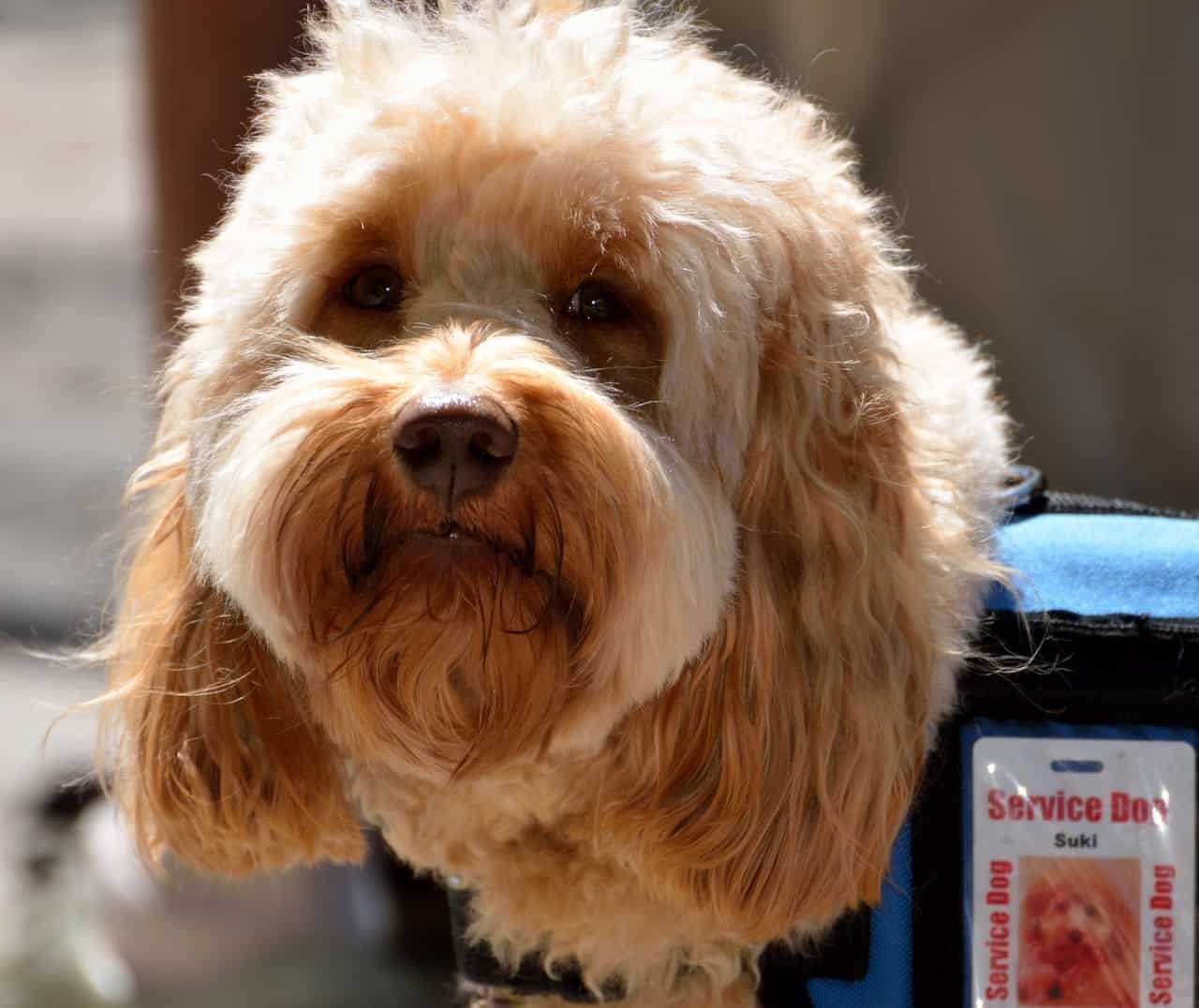
Poodles are some of the most intelligent dog breeds worldwide, bred as working dogs in the past. This breed used to work as a water retriever, truffle sniffer, and even a circus performer!
Today, Poodles make lovely family pets, with many still working as service dogs or emotional support animals. But do Poodles make great service dogs? And if so, how can someone register their pet as one?
Read on to find out everything you need to know about the Poodle Service Dog.
About Service Animals: Where are They Allowed?
Before delving into Poodle service dogs, you might be wondering what service animals are and where they are allowed in.
People professionally train service animals to do work or tasks for disabled people. Such tasks include:
- Guiding those who are blind
- Alerting those who are deaf
- Pulling wheelchairs
- Alerting and protecting those who have seizures
- Reminding owners to take their prescribed medications
- Calming their owners with mental disabilities, such as PTSD, among others
Service animals are not pets but working animals. Dogs who solely provide emotional support and comfort are not qualified as service animals under the Americans With Disabilities act. However, some states and local laws have a broader definition of service animals compared to the ADA.
Service animals are allowed in facilities where the public is typically permitted to visit. For instance, service animals are allowed in hospitals, particularly in clinics, cafeterias, or examination rooms. However, service animals aren’t allowed in operating rooms or burn units, as they are sterile environments.
Are Poodles Good Service Dogs?
We know Poodles as a breed with adorable teddy bear faces, stealing the spotlight in dog shoes. They are far more than that, though, working as excellent service dogs!
Many people and professional trainers admire Poodles for their intelligence, affection, loyalty, eagerness to please, and high activity levels. All of these characteristics make a fantastic service dog that people with disabilities will love.
Here are the traits that the Poodle has, making them excellent service animals:
- They are intelligent and easy to train. Poodles are excellent in scent training, making them ideal for diabetic alerting.
- Poodles are obedient and eager to please, making them dependable and want to serve you well.
- They are alert and loyal to their owners, making them good guard dogs.
- Poodles don’t bond quickly with strangers, so they experience fewer distractions. However, they are still friendly enough with new people, and with proper socialization, they do not have aggressive behavior when exposed to strangers in public areas.
- Poodles are natural retrievers, bred as water retrievers and hunting companions. That is a highly desirable train in service dogs, as they will do some form of retrieving daily.
- While a bit smaller, a male Standard Poodle can do light mobility work.
- People consider Poodles to have a hypoallergenic coat, a must for people prone to allergic reactions.
- They have a longer lifespan and work-life compared to other breeds.
- Poodles work excellently with children and other pets, though preferably, it’s best only to have one dog in the household.
That said, there are a few caveats to having a Poodle as a service dog, such as:
- Poodles can have high grooming requirements. We recommend brushing Poodle’s coat daily, which may be an issue for those with physical disabilities and who live alone.
- They have high energy levels and require daily exercise to prevent irritable behavior. While their energy levels are a huge advantage, owners can find difficulty finding the time or energy to train and exercise their Poodle. Note that Poodles require physical and mental stimulation, so that may be a handful!
- Poodles are smaller than other service dogs, such as German Shepherds, Golden Retrievers, and Labradors, with the Standard Poodle growing up to 15 inches. That can be an issue if you need a service animal to do heavier tasks, such as pushing wheelchairs.
- Miniature and Toy Poodles can be service dogs, though their smaller size may make it difficult with children, especially if they play rowdily. But if you have older children or teach the younger ones how to care for the Minature or Toy Poodle, then it will be fine.
After weighing the advantages and disadvantages of owning a Poodle as a service dog, you can now proceed to registering your Poodle or adopting one.
Poodles are excellent service dogs when you need someone for retrieving small-to-medium items, sense if an attack is coming through their scent, and provide emotional support to calm you down during episodes. A Poodle’s smaller size and good strength make it easier for him to fetch items in hard-to-reach areas, like under seats or tables.
Also, you’ll be surprised with how a Poodle’s high energy can pump you up! An active Poodle can stimulate their human owners, creating positive energies like confidence, courage, persistence, and responsibility. Poodles are sensitive to people’s emotions, so they can detect what you feel, helping you stay aware and positive.
As long as you can meet their care requirements, they will be lifelong companions ready to help and improve your quality of life. We recommend Poodles as your service dog if you need support for less physically demanding tasks. Those who are diabetic, epileptic, or are diagnosed with a hearing impairment or PTSD say that they find Poodles a perfect companion in many public areas.
However, if you require a bigger dog that can do heavier tasks, or if you are a bit on the bigger side, the Poodle may not be the best choice. Furthermore, people with disabilities living alone and unable to meet the high care requirements of the Poodle may want to reconsider service dog breeds.
How to Register Your Poodle as a Service Dog
If you’re interested in having your Poodle registered as a service dog, you must meet the following requirements first:
- The Poodle owner should be at least 12 years old. For those with autism, the child should be 6-12 years old.
- There should be no other dog in the household.
- The owner needs to be diagnosed with a mental or physical disability, such as neurological disorders affecting the limbs. You need to enroll your child with autism in a continuing education program involving recreational, occupations, physical, and speech therapy.
- Owners must live in a stable home environment. This requirement applies to those with autism, with children living with their parent or guardian of over 18 years old.
- The owner needs to be cognitively and physically capable to participate in about one hour of service dog training a day.
- Owners should have the ability to handle and command service dogs independently. Furthermore, the owner should meet the physical, emotional, and financial requirements of owning a service dog.
If you check all the requirements, then you’re well towards your way to the first step of registering your Poodle as a service dog. To do this, you have to file your application with the Dog Knowledge Service Dog Foundation. The application should include a signed letter from the physician indicating your condition and that you’re going through treatment in the last six months (or longer).
Alternatively, you can adopt a service dog instead of registering your Poodle if you own one. Of course, there are qualifications and requirements you must meet to adopt a pre-trained Poodle service dog. You need to show proof of your condition through a medical certificate.
Otherwise, you can purchase a Poodle from reputable breeders or train your Poodle if you already own one. Make sure that you look into responsible breeders or adopt pre-trained service animals from known organizations, as breeders sell fake service dogs online!
After deciding, the next step will require training and a final test, which we’ll tackle in the next section.
But before that, you also need to consider whether or not your Poodle is a good service dog for you. Other than the pros and cons mentioned above, consider these points:
Why do you need a service dog?
For those who have significant physical disabilities that require protection of assistance with tasks, then a Poodle isn’t the best idea. One example is seeing-eye dogs, usually larger breeds, as they can alert bystanders better, giving their owners more room.
But if you require assistance with trauma-related issues needing a dog for emotional support, then Poodles are an excellent option.
What’s your Poodle’s medical status?
It’s against the law for any dog to be denied the status as a service dog solely based on its breed and weight. That’s why Poodles can be service dogs, and they have the characteristics to prove it.
But still, you need to consider if your Poodle is up to the task. Here are medical considerations to look into:
- Does your Poodle have the capabilities to do the work you need doing?
- Is your Poodle healthy, or are there chances that the duties and stress of being a service dog endanger his health?
- How old is your Poodle? Realistically, does he have remaining years to perform his duties? For instance, it may be difficult for senior Poodles to provide emotional support with the training required to become a service dog.
- What is your Poodle’s personality? While Poodles are intelligent and affectionate, their characteristics may change from individual to individual. That can mean your Poodle might not have the character that suits the work needed.
- Have your Poodle cleared against any joint issues or other genetic conditions he may likely inherit.
Training Your Poodle
You can have your Poodle professionally or do it yourself with the proper service dog training materials. You can find these materials for sale or get special training videos.
There aren’t any American Dog Association certificates required as proof of their training, so it’s up to you whether you want to take them to a professional or train them yourself.
That said, we highly recommend taking your Poodle to a service dog training facility. These places have an excellent service dog program to lessen pet owners’ time and effort during the training process.
Most programs will take about six months long, requiring at least 120 hours of training. Usually, it would take two years!
But even if your Poodle isn’t in training, you should spend time socializing with other people and animals. Experts recommend that you spend teaching your Poodle service dog in public!
Service dogs need to learn how to respond in case their owner experiences an episode. So, it would be best to spend more time training the Poodle on areas specific to their owner’s condition. These are some of the skills your Poodle should learn about:
- How to detect medical warnings
- Trigger actions during manic states
- How to ground their owner in public areas
Before your Poodle becomes a legitimate service dog, he should pass the National Service Animal Registry public access examination. Here are some of the things your Poodle should be able to do in public areas:
- No sniffing places or people unless instructed
- No begging for attention or food in public
- No assertive behavior that would make anyone around the Poodle feel threatened or uncomfortable
You can check out the Assistance Dog International’s website to learn more about the complete list of topics the test covers.
When your Poodle passes the test and is now a certified service dog, you’re ready to go out worry-free with your companion!
There aren’t any certificates that prove your Poodle is a service dog, though there are a lot of public areas that ask for it, such as airports or restaurants. The law doesn’t require you to prove your service dog’s legitimacy, but it does get irritating!
Prevent any headaches and prepare ahead by doing:
- Always bring documentation or proof that your Poodle completed therapy dog training programs.
- Keep your medical and therapy prescriptions issued by your doctor.
- Have your Poodle wear a unique collar or vest that shows he is a service dog.
- When making reservations in restaurants or when booking flights, let people know that you’ll be bringing a service dog with you.



